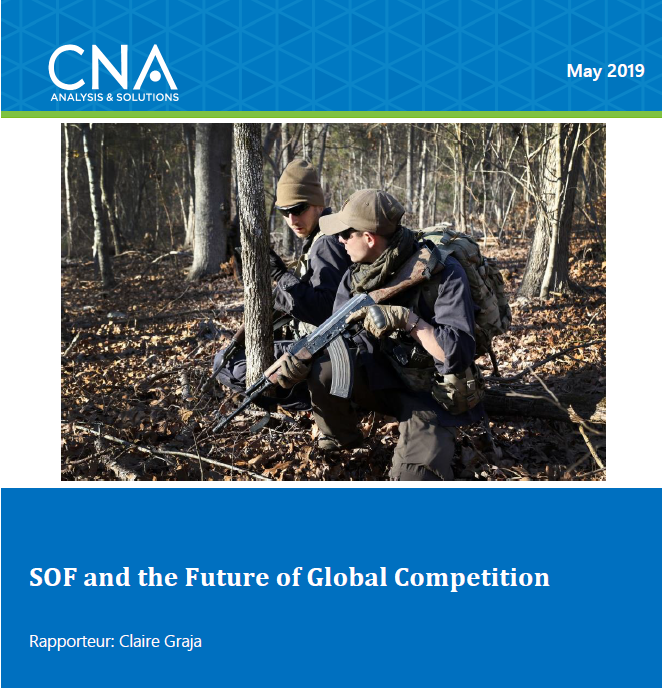The 2018 National Defense Strategy (NDS) makes clear that competing effectively with state adversaries will be the primary focus of the Department of Defense (DOD) going forward. Irregular warfare (IW) is a key element of modern great power competition (GPC), and our adversaries are deftly exploiting unconventional methodologies—particularly the use of information and intermediaries (i.e., proxies and surrogates)—as mediums of national influence. In March 2019, CNA hosted a cohort of academic, government, and military experts for a discussion on how special operations forces (SOF) can best lead or support US Government (USG) efforts to compete successfully on a global scale using information operations and intermediary partnerships. Key themes from this discussion included the following:
The US must embrace irregular warfare as inherent to modern great power competition
- Today’s state-on-state competition emphasizes a way of war that mitigates the risk of escalation and maximizes the potential for achieving strategic goals. Technological advances in media production and dissemination along with abundant opportunities for sponsorship in third-party conflicts have primed the environment for great power interjections via irregular approaches. Although its near-peer adversaries have embraced IW, US investments in modern unconventional capabilities have been lethargic and disjointed. To compete successfully on the global stage, the US must commit to an IW strategy with both institutional and operational components, and invest in the capabilities needed to implement it.
SOF’s strategic role in today’s irregular battlespace must be defined and implemented
- SOF represent the only US military entity to consistently train for and conduct unconventional warfare operations, and they maintain a significant portion of DOD’s IW capabilities. As such, the US Special Operations Command (SOCOM) has the ability to advance US interests in the global competition for influence. If DOD is to engage effectively in today’s evolving battlespace, it would benefit from investing in this deep IW expertise and emphasizing irregular forces and methods along with conventional services and mediums.
SOF need a collaborative civilian partner for conducting information operations
- A cohesive whole-of-government approach is essential to effective global competition and the success of a sustained IW strategy. Developing a civilian counterpart to SOF’s information warfare mission—an entity in the tradition of the US Information Agency—would facilitate mutual support and partnership between SOF practitioners and civilian policy-makers. This entity would also hone the messaging used in US information operations, ensuring that they are eloquent, diplomatic, effective, and consistently aligned with both US strategy and democratic values.
Practitioners need to study and understand the tactical and strategic toolkits for irregular operations
- The modern irregular battlespace combines classic techniques (e.g., third-party force sponsorship and information censorship) with new modes of influence (e.g., offensive social media attacks). Thus, it is essential that practitioners define and implement the most effective methods for promoting the American narrative around the world—and ensure that it has greater integrity and resonance than its competitors’ messages.
The US must define the future of IW and the American narrative as key elements of its competition for global influence
- Great powers are approaching a battlespace confined by mutual nuclear and conventional deterrence. This dynamic places greater strategic importance on unconventional actions and challenges the effects of US military supremacy. To compete in this environment, the US needs to establish a new American way of irregular war, invest in the entities to enact it, and hone the messaging to guide its operations.
Participants generally agreed that the United States’ nation-state adversaries are pursuing global influence via irregular campaigns, rather than by conventional ones. Adversaries avoid engaging the US in areas and through mediums where it still holds unparalleled dominance, choosing instead to exploit our chronic inattention to IW. Near-peer competitors are conducting sophisticated influence operations that span the kinetic and nonkinetic domains, from sponsoring proxy conflicts to waging disinformation and propaganda campaigns. The common understanding of irregular forces is evolving by extension—cyber warriors, criminal traffickers, and propagandists are operating alongside the stereotypical guerrillas and covert actors. In a climate where tanks and battleships are more deterrent than dynamic, multi-skilled irregular warfighters ensure that IW will stand as the most practical and prevalent method of war. The US must reintegrate unconventional methodologies into its defense strategy to remain competitive in this evolving environment.
Download reportDISTRIBUTION STATEMENT A. Approved for public release: distribution unlimited. 5/10/2019
Details
- Pages: 26
- Document Number: DCP-2019-U-020033-Final
- Publication Date: 5/10/2019
